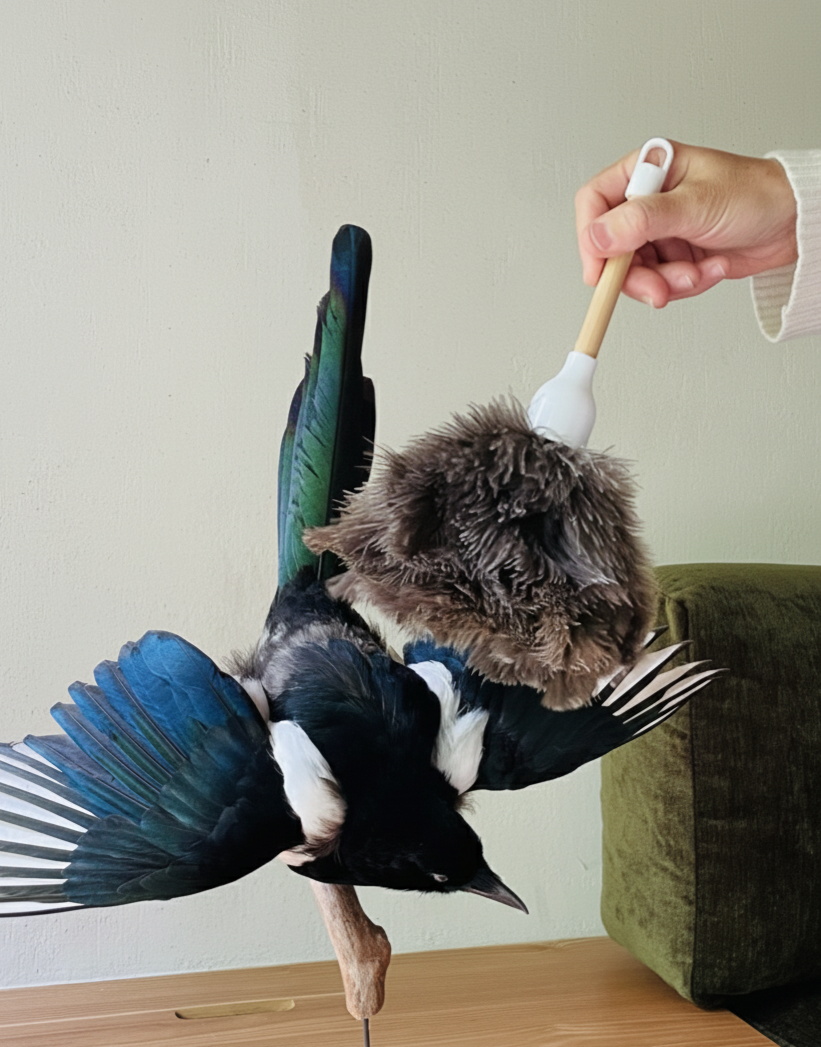Taxidermy Care & Maintenance Guidelines
The Environment
Taxidermy is highly sensitive to environmental conditions, which can vary considerably between different rooms of a house, between different seasons, and also between different places in the world.
The recommended conditions:
Temperature: Between 16 - 22°C (60 - 72°F) and most importantly, keep it stable. Avoid placing taxidermy near heat sources like fire places, bright spotlights, radiators, air conditioning and vents.
Humidity: Maintain relative humidity at 45 - 55%. You may want to use a humidifiers or dehumidifiers to maintain a consistent environment. If you live in a tropical or very dry region, you may display your taxidermy pieces inside sealed glass domes or cases to help regulate environmental conditions.
Too humid = risk of mold, mildew, and insect damage.
Too dry = risk of cracking skin, brittle fur, feathers, or other materials.
Light: Avoid direct sunlight and strong artificial lighting. UV rays cause fading, discoloration, and material degradation. If necessary, adjust the position of your taxidermy pieces seasonally to avoid direct sunlight.
Cleaning & Maintenance
The biggest enemy of taxidermy is dust. Regular, gentle cleaning will help keep your piece vibrant and well-preserved.
Here are some recommendations of how to clean:
Use a soft, dry brush (like a makeup brush or ostrich feather duster) to gently remove dust.
Always apply the brush in the direction of the growth of hair or feathers.
You may gently blow away dust with a hand blower - avoid using compressed air on feathers.
Never use household cleaners, sprays, or water.
For valuable, antique, or delicate pieces, you may have them professionally inspected every few years to check for signs of wear, damage, or pests.
Pest Prevention
Insects such as moths and dermestid beetles are serious threats to taxidermy collections. You may protect your pieces with the following suggestions:
Keep the area clean and dust-free, vacuum clean around bases, shelves, and storage areas regularly.
Use natural pest deterrents like small cedar wood blocks, lavender, and clove or bay leaves near your taxidermy. These natural products repel insects, they do not kill insects.
Inspect each piece every few months for signs of pests: tiny holes, loose hairs or feathers or droppings. If you notice any issues: immediately isolate the piece (for example in a plastic box) and contact a professional taxidermist.
Handling & Transport
Taxidermy is fragile and should be handled carefully, especially during moving or shipping.
Tips for safe handling:
Always lift by supporting the base, never by antlers, limbs, tails, or other delicate parts.
Wrap pieces in soft, breathable materials (like cotton sheets) and avoid plastic, which traps moisture.
For long-distance transport or international shipping, use rigid crates with shock-absorbing padding.
Always handle taxidermy with clean, dry hands or cotton gloves.
Storage Tips (for pieces not on display)
If you need to temporarily store your taxidermy:
Store in a cool, dry, and dark place with stable conditions.
Wrap the piece loosely in breathable, soft fabric like cotton or unbleached muslin, avoid plastic coverings.
Place cedar wood blocks, lavender, and clove or bay leaves nearby to deter pests.
Avoid attics, basements, or garages where temperature and humidity fluctuate.
Check stored items every few months for signs of pests, moisture, or deterioration.
What to Do in Case of Accidental Damage
If your taxidermy piece is accidentally damaged:
Do not attempt home repairs - adhesives, tape, or glue can cause irreversible damage.
Carefully collect any detached parts (feathers, fur, claws, or antlers) and store them safely.
If the damage is minor (e.g. a small area of loose fur), wrap the piece in soft fabric and keep it in a safe location.
Contact a professional taxidermist for proper restoration advice and services.
Prompt attention to damage can prevent further deterioration and ensure the piece can be properly restored.
If you have questions, concerns, or require professional maintenance services, I’m happy to help.
Email: katjaguilini@gmail.com
Phone: +32 (0)478 43 91 67
